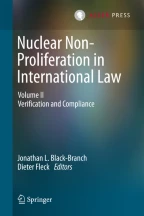
Almost 20 years ago, on 10 September 1996, the United Nations General Assembly adopted the Comprehensive Nuclear-Test-Ban Treaty (CTBT). This Treaty, which seeks to prohibit any nuclear test explosion in any environment, including underground, was part of a carefully balanced diplomatic deal struck in 1995 that made an indefinite extension of the Non-Proliferation Treaty (NPT) possible. As the time span for entry into force of the Treaty was envisaged to last only a few years, States signatories of the Treaty simultaneously established a Preparatory Commission, which is under international law considered a separate international organization from the Comprehensive Nuclear-Test-Ban Treaty Organization (CTBTO) proper. Since 1997 the Commission has worked tirelessly to prepare for the Treaty’s entry into force, in particular by building up an elaborately designed universal verification regime. This verification regime is now largely complete and of proven effectiveness and robustness, despite the unforeseen fact that, close to 20 years after its opening for signature, the Treaty has yet to reach full legal standing. This chapter will elucidate in more detail the present legal status of the CTBT, the functioning of its verification regime as it exists to date, as well as the means for completing the verification regime as foreseen in the Treaty.
Sabine Bauer is a Special Assistant to the Executive Secretary of the Preparatory Commission for the Comprehensive Nuclear Test ban Treaty organization, with a background in international law and the laws of international organizations and 18 years of practical legal experience in international organizations, She is admitted to practice law at the New York State Bar.
Cormac O’Reilly is an External Relations Officer at the Provisional Technical Secretariat. He has worked for 14 years in multilateral affairs and disarmament issues, including in the Ministry of Foreign Affairs of Ireland, and is a barrister-at-law and member of the Inn of Court of Northern Ireland.
The views of the authors are personal and may not be attributed in any way to reflect the views of the Commission and its State signatories.
This is a preview of subscription content, log in via an institution to check access.